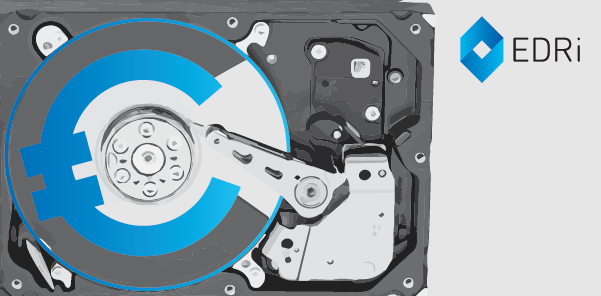Private copy levy: Just pay up! Then we’ll see…
European businesses and associations are still in reality forced to pay “compensation” to copyright collecting societies for private copies, despite repeated rulings of the Court of Justice of the European Union (CJEU) exempting them from having to do so.
European Digital Rights (EDRi) recently received an invoice from our office supplies company for the purchase of an external hard drive, which included a near-7% private copy levy of the total amount. The private copy levy is the surcharge on the price of media capable of making copies. It is supposed to compensate the alleged harm done to rightsholders by legal private copying by private end-users of those devices. The device we purchased will not be used to make copies of copyrighted content.
Article 5 of the 2001 Copyright Directive states that fair compensation for private copies applies to a natural person for its private, non-commercial use. This has led the 28 EU Member States to take hugely varied approaches to implementing this provision, undermining the single market. Furthermore, the system can be absurdly expensive to implement – Digital Europe calculates that the establishment and implementation of the Dutch system cost 50 million euro, in order to collect 40 million euro.
The 2011 and 2015 CJEU rulings in Padawan v SGAE and Copydan Båndkopi/Nokia Danmark cases clarified explicitly that the Private copy levy do not apply:
- To media sold to legal entities.
- For purposes other than private copying.
Again in 2016, the CJEU repeated that private copying exception is intended solely for individuals, and that legal entities are excluded.
So… How come that EDRi, a legal entity and the final user of the product, should still pay the private copy levy?
It was probably obvious to the retailer who sells office equipment, furniture and supplies to professionals, that EDRi is not a private person who is required to pay the private copy levy. But never mind, as they were preemptively charged the fee by their the wholesaler, and their wholesaler was charged by the manufacturer or importer, they passed on the hot potato to the end users.
Rather contradictorily, this blindness of applying the private copy levy to entities without any consideration as to know whether these entities are liable for it, has been made possible by the above mentioned Copydan Båndkopi/Nokia Danmark ruling. Its paragraph 53 still allows Member States to impose the levy when it is difficult to identify whether the final user is a private or a legal person, provided that the levy be passed on in the transaction chain to the final user and that undue, established payers can be easily reimbursed – if they just ask for it.
The situation is absurd: EDRi has an obligation to pay the levy that it should not pay in the first place, then ask Auvibel, the company collecting the private copy levy in Belgium, for reimbursement in order to ensure its right not to pay the levy. Even if the name “Auvibel” and an amount corresponding to the levy appears on the invoice, it is likely that numerous professionals do not even notice they pay private copy levies that they should not be paying, and consequently do not ask for a refund. In 2016, Auvibel invoiced 23 million euro for private copy levies. From that amount, it is not known to the public how much is collected from non-private users or for non-private use, nor the amount reimbursed to those categories. Similarly, many organisations will not want to invest administrative resources in reclaiming a few euro every time they buy a hard disk, printer, DVD drive, USB key, etc.

Europe-wide, this extremely expensive bureaucracy generated 580 million euro for private copy levies in 2015, according to official figures. However, there is no estimate of the proportion of illegitimate, automatic, collection of private copy levies from professional end-users.
Maybe we should bounce this back by invoicing Auvibel, in addition to the private copy levy reimbursement, for the harm caused by a time-and-money wasting, inappropriate, legally dubious, private copy levy collection for professional use of computer equipment. Or maybe the Belgian government could charge a levy to Auvibel, to recoup the unjustified revenue and spend the money on social projects.
(Contribution by Julien Bencze, EDRi)


